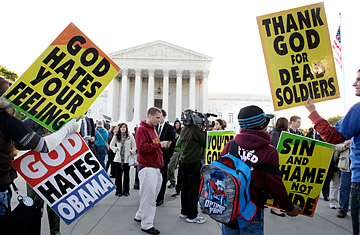
Members of the Westboro Baptist Church picket in front of the Supreme Court
(2 of 2)
Inside the courtroom, it didn't take long for the Justices to start picking apart the arguments. "We are talking about a funeral," Albert Snyder's lawyer Sean Summers began in his opening remarks. "If context is ever going to matter, it has to matter in the context of a funeral." Then Justice Antonin Scalia interrupted, asking, "Are we just talking about a funeral? That's one of the problems I have with the case." Legal analysts had predicted that some of the facts surrounding the case would give Scalia trouble. They were spot-on. The Justice pointed out that Albert based his emotional-distress claim in part on offensive words that Westboro published about the Snyder family on the Internet about a month after the funeral. "What does that have to do with a funeral?" Scalia asked.
Justice Ruth Bader Ginsburg challenged Albert's claim of invasion of privacy. She pointed out that even under Maryland's funeral-picketing statute, which was passed after Matthew's funeral, the Phelpses weren't breaking any laws. They had checked with police on how far away from the church they should stand, and they left around the time the funeral began. Scalia followed up by noting that the Snyder family had rerouted the funeral procession to avoid seeing the protesters. "Is that the extent of the disruption?" Scalia asked incredulously. Summers responded by saying that since Westboro "took away the peaceful experience" of a private figure, the rerouting had invaded Albert's privacy.
Later, however, Scalia challenged Fred Phelps' daughter Margie Phelps, an attorney representing Westboro before the court. The Justice questioned whether Westboro's hate speech should qualify as "fighting words," which are not protected by the First Amendment, and wondered why Albert shouldn't be entitled to an emotional-distress claim, since he had suffered physical injury. (At the trial, Albert's doctors testified that the stress caused by Westboro at his son's funeral had worsened his diabetes.)
But it was Ginsburg who asked Margie perhaps the biggest zinger of the day: "Why should the First Amendment tolerate exploiting this bereaved family when you have so many other forums for getting across your message?" Ginsburg noted that the same day the Phelpses picketed Matthew's funeral, they had also protested at the state capitol in Annapolis.
During the arguments, Margie appeared more confident, and less stammering, than her opponent. But she seemed to bother the Justices by insisting that Albert was a public figure and thus a less-protected target of offensive speech. Albert had attained public status, Margie argued, since he spoke to the media about Matthew's death before the funeral and since he published the time and location of the service in local newspapers. It was a strange strategy, particularly since the appellate court had ruled that Westboro's speech received First Amendment protection — regardless of whether it was directed toward a public or private figure — as it was hyperbolic and couldn't be proved false.
A few Justices indicated that they might want to take on the larger First Amendment questions that stem from Snyder v. Phelps. For example, after establishing that Albert had seen the offensive content of the signs on television and the Internet, rather than during the funeral, Justice Stephen Breyer raised two questions. "One is, Under what circumstances can a group of people broadcast on television something about a private individual that's very obnoxious?" he said. "And the second is, To what extent can they put that on the Internet, where the victim is likely to see it? Now, those are the two questions that I am very bothered about. I don't know what the rules ought to be there." These questions may help explain why so many news organizations signed an amicus brief supporting Westboro's right to free speech. Was Breyer suggesting that the media could be complicit for having broadcast the hate speech?
After the arguments concluded, Margie marched down the Supreme Court steps with her sister Shirley Phelps-Roper; both had huge smiles on their faces. Shirley did a little jig and said, "If I could shout 'Woo hoo!' right now, I would say, 'Woo hoo!' " (There was nothing stopping her.) Margie, so controlled and logical in the courtroom, later started singing to the tune of Ozzie Osbourne's "Crazy Train" with her family at a press conference: "Cryin' bout your feelings/ For your sins, no shame/ You're going straight to hell on your crazy train."
While the Phelpses conducted their press conference, a group of veterans surrounded Albert, who was nearby. He couldn't see the Phelps family, and he wasn't looking. When Summers came down the steps, he and Albert hugged, and the crowd on the plaza applauded. Albert's party walked across the street to the Capitol, where they met Keith Atkins, an officer for the U.S. Capitol Police. Atkins presented Albert with the flag his unit had flown that morning over the House of Representatives in Matthew's honor. The officer read a personal note to Albert. "Our country is forever grateful to Lance Corporal Matthew Snyder," Atkins said. "May God bless the Snyder family. And may God bless the United States of America."
